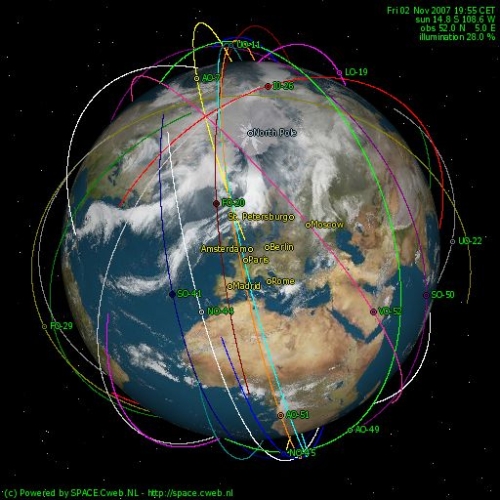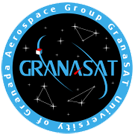There is a huge amount of satellites in orbit that can be used by amateur radio enthusiastics. The ISS is one of those satellite whit its own rules to be able to contact it. Those satellites that use a frequency use by the amateur radio enthusiastics are called OSCAR (Orbiting Satellite Carrying Amateur Radio). This name comes from the first satellite sent with this characteristics, OSCAR 1 in 1961. Since then, more satellites like that have been sent all around the world. They have been used for scientific missions as well as educational purposes. First step of our ground station should be then to learn how to use this kind of devices.

As introduction to the behaviour of these satellites, their orbit and the steps to follow to use them we recommend the following link (in Spanish) which explains all that is needed before starting to work on it:
               http://ea8ate.blogspot.com.es/2009/07/satelites-de-radioaficionados.html.
We can have a look at the satellites that are right now actives, to get an idea about what is around. Their frequency and parameters can be checked in their website:
- AO-7 (AMSAT-OSCAR 7):Â Oldest OSCAR which still works, sent in 1974.
- UO-11 (UoSAT-2): Developped in Surrey University, launched in 1984.
- AO-27 (Eyesat-1): One of the most known.
- FO-29 (Fuji-OSCAR 29): Desinged in Japan and launched in 1996, one of the most used for starting to work.
- SO-50 (Saudi-OSCAR 50): As the one before very popular. Desinged in South Arabia and launched in 2002, its FM repeater is working perfectly.
- Cute-1 (CubeSat-OSCAR 55): Oldest CubeSat working, launched in Japan in 2003.
- PRISM (HITOMI): Created in Tokio University and launched in 2009 whit and advanced transmission system. Its technical data is one of the most complete. For using it, check here
- SwissCube-1: Developped by the École polytechnique fédérale de Lausanne (Switzerland) and launched in 2009. Really interesting.
- AO-71 (AubieSat-1):Â CubeSat made in Alabama University (USA).
- Xatcobeo: CubeSat from Vigo’s University (Spains), right now in orbit.
Other interesting links:
- State of the active satellites , by DK3WN:Â http://www.dk3wn.info/p/?s=active+satellites&x=0&y=0
- Another list of radio amateur satellites:Â http://www.satview.org/lista_sat.php?cat=amateur
- Some history, article from 1994 about the history of AMSAT: http://www.amsat.org/amsat-new/AboutAmsat/amsat_history.php
- A satellite with Arduino, ArduSat: http://www.kickstarter.com/projects/575960623/ardusat-your-arduino-experiment-in-space
Â

